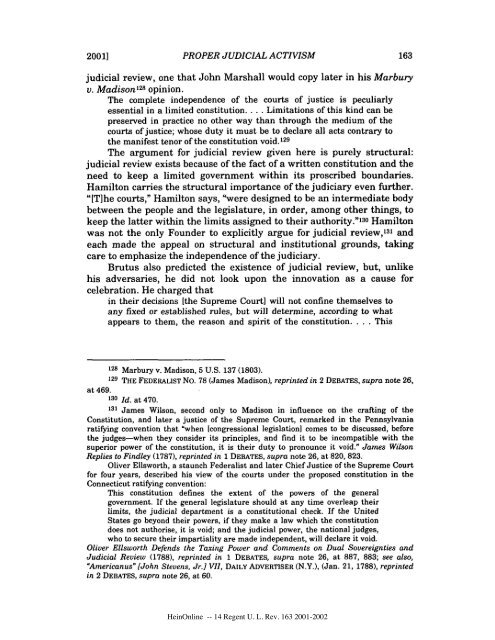Judicial ReEngineering
Judicial ReEngineering
Judicial ReEngineering
Create successful ePaper yourself
Turn your PDF publications into a flip-book with our unique Google optimized e-Paper software.
20011<br />
PROPER JUDICIAL ACTIVISM<br />
judicial review, one that John Marshall would copy later in his Marbury<br />
v. Madison 128 opinion.<br />
The complete independence of the courts of justice is peculiarly<br />
essential in a limited constitution .... Limitations of this kind can be<br />
preserved in practice no other way than through the medium of the<br />
courts of justice; whose duty it must be to declare all acts contrary to<br />
the manifest tenor of the constitution void. 1 29<br />
The argument for judicial review given here is purely structural:<br />
judicial review exists because of the fact of a written constitution and the<br />
need to keep a limited government within its proscribed boundaries.<br />
Hamilton carries the structural importance of the judiciary even further.<br />
"[Tihe courts," Hamilton says, "were designed to be an intermediate body<br />
between the people and the legislature, in order, among other things, to<br />
keep the latter within the limits assigned to their authority." 130 Hamilton<br />
was not the only Founder to explicitly argue for judicial review, 131 and<br />
each made the appeal on structural and institutional grounds, taking<br />
care to emphasize the independence of the judiciary.<br />
Brutus also predicted the existence of judicial review, but, unlike<br />
his adversaries, he did not look upon the innovation as a cause for<br />
celebration. He charged that<br />
in their decisions [the Supreme Court] will not confine themselves to<br />
any fixed or established rules, but will determine, according to what<br />
appears to them, the reason and spirit of the constitution .... This<br />
128 Marbury v. Madison, 5 U.S. 137 (1803).<br />
129 THE FEDERALIST No. 78 (James Madison), reprinted in 2 DEBATES, supra note 26,<br />
at 469.<br />
130 Id. at 470.<br />
131 James Wilson, second only to Madison in influence on the crafting of the<br />
Constitution, and later a justice of the Supreme Court, remarked in the Pennsylvania<br />
ratifying convention that "when [congressional legislation] comes to be discussed, before<br />
the judges-when they consider its principles, and find it to be incompatible with the<br />
superior power of the constitution, it is their duty to pronounce it void." James Wilson<br />
Replies to Findley (1787), reprinted in 1 DEBATES, supra note 26, at 820, 823.<br />
Oliver Ellsworth, a staunch Federalist and later Chief Justice of the Supreme Court<br />
for four years, described his view of the courts under the proposed constitution in the<br />
Connecticut ratifying convention:<br />
This constitution defines the extent of the powers of the general<br />
government. If the general legislature should at any time overleap their<br />
limits, the judicial department is a constitutional check. If the United<br />
States go beyond their powers, if they make a law which the constitution<br />
does not authorise, it is void; and the judicial power, the national judges,<br />
who to secure their impartiality are made independent, will declare it void.<br />
Oliver Ellsworth Defends the Taxing Power and Comments on Dual Sovereignties and<br />
<strong>Judicial</strong> Review (1788), reprinted in 1 DEBATES, supra note 26, at 887, 883; see also,<br />
"Americanus" [John Stevens, Jr.] VII, DAILY ADVERTISER (N.Y.), (Jan. 21, 1788), reprinted<br />
in 2 DEBATES, supra note 26, at 60.<br />
HeinOnline -- 14 Regent U. L. Rev. 163 2001-2002

















